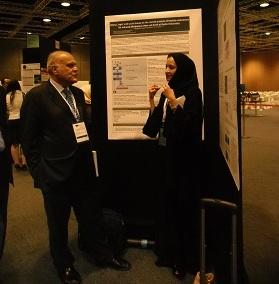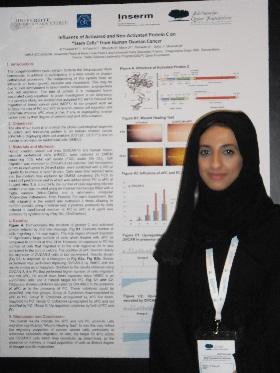Using AI to control energy for indoor agriculture
30 September 2024
Published online 5 March 2012

Stem cell research began in Qatar in 2007 when the Qatar Foundation joined forces with the Baker Institute, a policy institute and part of Rice University in Houston, Texas. Their goal is to help develop stem-cell research in the small Gulf country.
One of the first steps taken by the collaborations was to form the International Programme on Stem Cell Science and Policy, charged with examining the ethical and religious issues involved in stem-cell science, relevant to Arab culture, and engaging with local communities. Five years on, the plan is bearing fruit.
Hamda Al-Thawadi, Halema Al-Farsi, Heba Al-Siddiqi and Sarah Abdullah joined the Qatar Science Leadership Program (QSLP), a QF initiative that aims to groom Qataris to take leading roles in Qatari science and one day steer its ambitious national programme of research.
The QSLP sends students to train at some of the best universities in the world. And 2011 saw Al-Thwadi and Al-Farsi go to one of France's largest universities, University Paris-Sud 11, Al-Siddiqi go to Harvard Stem Cell Institute in Massachusetts and Abdullah go to the University of Cambridge in the UK.
At the Qatar International Conference on Stem Cell Science and Policy held this past week in Doha, Al-Thawadi, Al-Farsi and Al-Siddiqi presented their research on ovarian cancer and obesity-related diseases. Al-Thawadi practiced medicine for two years before applying for the QSLP. "In the past there was only one path for a medical doctor, treating patients. But when QF started this programme, they created a new path for doctors or graduates interested in science," she says. "This is a perfect chance for Qatar to create home-grown researchers."
A bioethics class at Cardiff University in the UK got Al-Siddiqi hooked. "There was a lot of controversy over using embryonic cells, so I took a class which made me read more about stem-cell research, and decided to go into it."

Nature Middle East
The first research paper Al-Siddiqi's co-authored was published in Nature Cell Biology in February 2012. "It felt amazing, especially after all the hours of hard work," she says.
Al-Thawadi and Al-Farsi decided to work on ovarian cancer as it is highly prevalent in the Middle East. Al-Thawadi incubated cancer cells in culture with Protein C, a coagulation factor, to test its effect on thrombosis of ovarian cancer cells, which led to a significant increase in metastasis. "This gives us a clue to outline preventative measures for thrombosis in ovarian cancer patients," she explains.
For the past year, Al-Farsi looked into ways to reprogram certain cancer stem cells. "They contain PD117, a factor found only in stem cells which allows them to regenerate. The same principle can be applied to other cancers."
Abdullah realised halfway through medical school in Nottingham University in the UK that research interested her more. She returned to Qatar with a neuroscience degree to look for an institution that would fund her to "research stem cell and neurological disorders, which aren't very common in Qatar at the moment."
Abdullah's focus is on the role of the transcription factor oxo-3a in myelin-forming cells called oligodendrocytes. When the factor disappears from cells after trauma or disease it can lead to neurodegeneration. "I hope to promote formation of differentiating cells by studying stem cells and look at why oligodendrocytes fail to remyelinate," Abdullah elaborates.
None of the budding young researchers feel they've faced gender discrimination. "It's better to be a female," laughs Al-Siddiqi. "I feel more privileged, and I think I'm treated better and there's a lot of support."
Living in Paris, Al-Farsi at first felt a bit out of place, and felt judged wearing a hijab, but has since settled in. "I feel accepted now."
Abdullah feels she is playing an important role in dispelling misconceptions about Arab women. "As an Arab woman I think people abroad are shocked at how modern and knowledgeable we are. For a long time Muslim women have made a name for themselves, and I'm just joining a group of established women."
The original article mistakenly stated Heba Al-Siddiqi published her first co-authored paper in Nature. It was published in Nature Cell Biology.
doi:10.1038/nmiddleeast.2012.26
Stay connected: